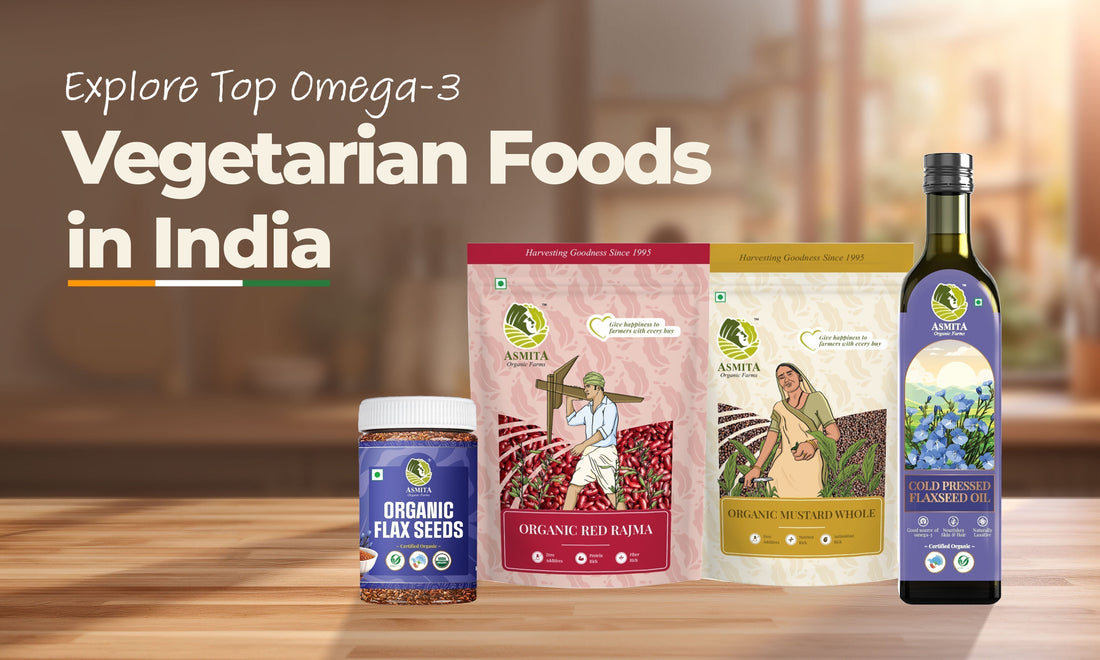List of Omega 3 Rich Vegetarian Foods in India
Info Organic 5 min read
“Wait, vegetarians can get Omega-3 too?”
If you’ve ever been told that Omega-3 fatty acids are only found in fish, welcome to the club. For years, fish oil capsules and salmon have dominated the Omega-3 conversation, leaving vegetarians feeling like they’re missing out on these ‘miracle fats’, the ones that boost brain function, keep your heart in check, and even fight inflammation.
But here’s the reality: vegetarians don’t have to miss out on Omega-3s.
India, with its rich and diverse plant-based food culture, is packed with vegetarian sources of Omega-3 fatty acids, many of which are sitting right in your kitchen! From humble flaxseeds to everyday leafy greens, your diet can be naturally abundant in Omega-3s.
So, if you’re a vegetarian looking to nourish your body with these essential fats without compromising your lifestyle, this guide to omega-3 rich vegetarian foods in India is your go-to resource.
Table of Contents
- What is Omega-3 Fatty Acid & Its Types?
- Omega-3 Vegetarian Food Sources in India
- Ways to Incorporate Omega-3 Rich Foods into a Vegetarian Diet
- Bottom Line
- Frequently Asked Questions
What is Omega-3 Fatty Acid & Its Types?

Omega-3 fatty acids are polyunsaturated fats important for various bodily functions, from building cell membranes to producing hormones that regulate blood clotting. They come in three primary types:
Alpha-Linolenic Acid (ALA)
Found predominantly in plant-based foods, ALA is the most common Omega-3 in our diets.
Eicosapentaenoic Acid (EPA)
Primarily sourced from fish and algae, EPA plays a crucial role in reducing inflammation.
Docosahexaenoic Acid (DHA)
Also abundant in fish and algae, DHA is vital for brain health and development.
While our bodies can convert ALA into EPA and DHA, the conversion rate is relatively low. Thus, it's essential to consume ALA-rich foods regularly, especially for those following a vegetarian diet and looking to get enough omega-3 in vegetarian foods.
Omega-3 Vegetarian Food Sources in India

Flaxseeds (Alsi)
Tiny yet mighty, flaxseeds are among the richest plant-based sources of ALA. Per tablespoon of flaxseed contains 2.35 grams of ALA (omega-3 fatty acid) along with a healthy dose of polyunsaturated fat.
Incorporate ground flaxseeds into your daily diet by sprinkling them over cereals, blending them into smoothies, or mixing them into doughs.
Kidney Beans (Rajma)

A staple in many Indian households, kidney beans are not only a great source of protein but also a valuable addition to vegetarian Omega-3 rich foods.
One cup of cooked kidney beans offers a modest amount of ALA, contributing to your daily intake. 100 grams of Rajma contain 557 mg of Omega-3 fatty acids, all of which are ALA, making them a great source of Omega-3 in vegan diet.
Enjoy them in traditional rajma curry or toss them into salads for a hearty meal.
Mustard Seeds (Sarson)
Commonly used in Indian cooking, mustard seeds and their oil are notable sources of ALA. A tablespoon of mustard oil contains approximately 826 mg of Omega-3s. These tiny seeds contain a high concentration of alpha-linolenic acid (ALA), which is converted to EPA and DHA in the body. Omega-3 content in Mustard seeds is 100 mg in 1tspn.
Chia Seeds

Despite their tiny size, chia seeds are packed with Omega-3s, making them one of the top Omega-3 fatty acids in chia seeds. Per tablespoon (12g) of chia seeds provides approximately 2,143 mg (2.14 g) of ALA Omega-3 fatty acids. They also provide fiber and protein. Create chia puddings, sprinkle them over yogurt, or mix into batters for baked goods.
Walnuts (Akhrot)
Walnuts are a delicious way to boost omega-3 in a vegetarian diet, with about 2.5 grams per ounce. Enjoy them as a snack, chop and add to salads, or blend into sauces. As one of the Omega-3 for vegetarians: it’s rich, buttery flavour complements both sweet and savoury recipes.
Soybeans (Bhatma)

Soybeans and their derivatives, like tofu and tempeh, are excellent vegetarian sources of Omega-3 fatty acids.
A 100-gram serving of soybeans provides approximately 1.2 grams of Omega-3s.
Incorporate them into stir-fries, curries, or salads for a protein and Omega-3 boost.
Plant Oils
Certain plant oils, such as flaxseed oil, are rich in Omega-3s and are excellent Omega-3 fatty acid vegetarian sources. For instance, per tablespoon of flaxseed oil contains about 7,196 mg of Omega-3s.
Leafy Greens

Leafy greens like spinach, brussels sprouts, and kale offer small amounts of ALA, making them valuable sources of omega-3 in vegetables to complement your diet.
While not as concentrated as seeds or nuts, they are still a valuable part of vegetarian omega-3 foods, contributing to overall Omega-3 intake.
Fruits
Certain fruits, such as kiwi, berries and mangoes, contain trace amounts of Omega-3s. While you can’t rely on fruits completely for your Omega-3 in vegetarian foods intake, they can complement an Omega-3-rich diet.
Ways to Incorporate Omega-3 Rich Foods into a Vegetarian Diet
Incorporating Omega-3 fatty acids into your daily diet in a way that’s delicious and sustainable? That’s when it truly starts working for you. Here are some creative and easy ways to make omega-3 vegetarian food sources a natural part of your meals:
1. Start Your Morning with an Omega-3 Boost

Flaxseed Smoothie: Add per tablespoon of ground flaxseeds to your morning smoothie or yogurt. Flaxseeds, rich in Omega-3 fatty acids in vegetarian food, have a mild nutty flavour and blend seamlessly with bananas, berries, or mangoes.
Chia Pudding: Soak chia seeds in almond or coconut milk overnight, add a dash of honey, and top with nuts or fruit for a creamy, Omega-3-packed breakfast.
2. Make Omega-3s a Staple in Your Lunch and Dinner

Rajma Makeover: Your beloved rajma (kidney beans) curry isn’t just a protein powerhouse, it also contains Omega-3 fatty acids. Pair it with brown rice for a wholesome meal.
Tofu Stir-Fry: Soybeans and tofu are excellent vegetarian Omega-3 fatty acids sources. Stir-fry tofu with veggies in mustard oil for double the Omega-3 punch.
3. Smart Snacking: The Omega-3 Way

Trail Mix with a Twist: Mix walnuts, roasted soybeans, and dried fruits for an on-the-go snack that’s nutritious and satisfying, packed with Omega-3 for vegetarians to keep you energised throughout the day.
Flaxseed Crackers: Bake your own seed-based crackers using flaxseeds, sesame, and whole grains for a crunchy, guilt-free munch. Omega-3 in vegetarian foods
4. Dress It Up with Omega-3 Rich Oils

Flaxseed Oil Dressing: Drizzle flaxseed oil over salads, pasta, or steamed veggies for a nutty, nutritious kick. (Avoid heating it, as high temperatures degrade its Omega-3 content.)
Mustard Oil Cooking: Use mustard oil for Indian curries, pickles, and stir-fries—it enhances flavour and adds Omega-3 fatty acids from vegetarian sources like ALA to your meals.
Importance of Omega-3 Fatty Acid Foods for Daily Intake

Omega-3s aren’t just another health buzzword. They’re an absolute necessity for your body to function optimally. Here’s why: Sources of Omega-3 in a vegetarian diet play a crucial role in supporting overall health and well-being.
1. Brain Fuel & Mood Booster
Did you know? Nearly 60% of your brain is fat, and a good portion of that is made up of Omega-3s! DHA, in particular, is crucial for memory, learning, and overall cognitive function.
Vegetarian sources of omega-3 like flaxseeds, walnuts, and chia seeds are excellent alternatives. Studies also suggest that Omega-3s may help combat anxiety and depression, so adding these plant-based options to your diet can be a powerful step toward better brain health.
2. Heart’s Best Friend
Omega-3s help lower bad cholesterol (LDL) and increase good cholesterol (HDL), reducing the risk of heart disease. They also keep blood pressure in check and prevent blood clots.
Regular consumption of omega-3-rich foods can significantly improve cardiovascular health by reducing inflammation and supporting overall heart function, helping to maintain a healthy circulation system.
3. Natural Inflammation Fighter
Chronic inflammation is linked to diseases like arthritis, diabetes, and even cancer. Omega-3s help reduce inflammation at a cellular level, keeping your body in better shape for the long run.
4. Skin & Hair Superfood
Flaky skin? Dry hair? Your body might be craving vegetarian omega-3 foods. These fats keep your skin hydrated, improve elasticity, and add shine to your hair.
5. Supports Eye Health
While DHA is the primary omega-3 in the retina, ALA can be converted into DHA in the body, contributing to eye health and potentially reducing the risk of age-related macular degeneration.
In short, Omega-3s are not optional, they’re essential for keeping your brain sharp, heart healthy, and body thriving.
Bottom Line

Omega-3s are a must-have in every diet, and if you’re vegetarian, you don’t have to miss out on these crucial nutrients. India’s rich food culture provides plenty of plant-based Omega-3 for vegetarians like flaxseeds, walnuts, mustard seeds, and kidney beans.
These powerhouse fats support everything from your heart to your brain. While fatty fish are the go-to for EPA and DHA, plant-based options like chia seeds, leafy greens, and even rajma can boost your Omega-3 intake naturally.
So, the next time someone asks, “Where do vegetarians get Omega-3s?”Just smile and point to your plate!
Frequently Asked Questions
Q1: Can vegetarians get enough Omega-3s without supplements?
Absolutely! By including flaxseeds, walnuts, chia seeds, soybeans, and mustard oil in your diet, you can meet your Omega-3 needs naturally with vegetarian omega-3 foods.
Q2: What’s the best plant-based source of Omega-3s?
Flaxseeds and chia seeds are the richest sources, offering more Omega-3s than many fruits and vegetables.
Q3: How much Omega-3 should I consume daily?
The recommended daily intake for ALA (plant-based Omega-3) is around 1.1 grams for women and 1.6 grams for men. One tablespoon of flaxseeds alone can meet this requirement.
Disclaimer: Always consult with a healthcare professional or a registered dietitian before making any significant changes to your diet or if you have any concerns regarding your health or nutritional needs. Individual results may vary, and the effectiveness of omega-3 fatty acids may depend on various factors, including lifestyle and overall diet.


